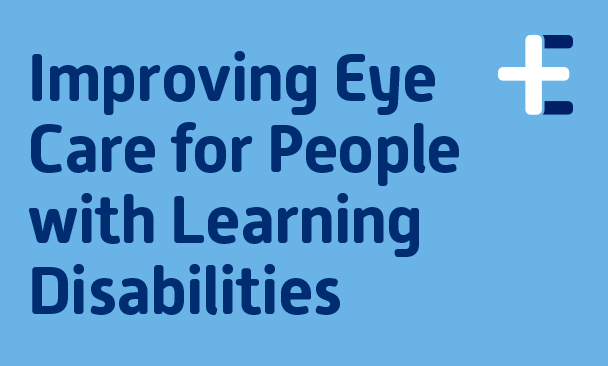Primary Eyecare Services (PES) Signs Letter in Support of Better Eye Care for People with Learning Disabilities

10 June 2022
PES is one of the signatories to a letter sent by the charity SeeAbility to the Secretary of State for Health and Social Care and Chief Executive of NHS England calling for improved eye care for people with learning disabilities.
The letter singles out three key calls being made by the charity’s Eye Care Champions:
- NHS England continues with the expected rollout of its NHS Special Schools Eye Care Service, as progress has stalled.
- That every new Integrated Care System has a community learning disability eye care pathway.
- To ensure everyone with a learning disability is eligible for NHS sight tests, as people with learning disabilities are at such a high risk of having a sight problem.
Donna O’Brien, SeeAbility’s Policy and Research Manager said:
“It has been fantastic to have such a breadth of influential voices and organisations supporting these calls for action, they represent the hard work that has gone in over many years by so many to improve eye care and address inequality. Everything we do is about how we can achieve a more equal right to sight, we hope that the most senior health leaders in the country will now help make this a reality!”
Dharmesh Patel, PES Chief Executive, said:
“Really glad Primary Eyecare Services joined SeeAbility and many others to support this call to reduce health inequalities experienced by those with a Learning disability in terms of access to eye care.
I’m proud that PES is the lead provider for the majority of community enhanced pathways where they are commissioned.”
A letter to Rt Hon Sajid Javid MP, Secretary of State for Health and Social Care and Amanda Pritchard, Chief Executive of NHS England – 8 June 2022:
Dear Secretary of State and Amanda,
Improving eye care for people with learning disabilities
We are writing to you to renew our calls for an equal right to sight for people with learning disabilities and ask you to take action.
With a refresh of the Long Term Plan, and a White Paper on health disparities due soon, there is an opportunity to make eye care much more accessible for people with learning disabilities.
Our coalition of voices and organisations have championed efforts to improve eye care for people with learning disabilities for many years, whether it be better awareness and training, to accessing sight tests and sight saving treatments, or ongoing support to live with a sight problem.
There are alarmingly high levels of sight problems amongst people with learning disabilities, adults with learning disabilities are 10 times more likely and children with learning disabilities 28 times more likely to have a serious sight problem compared to the general population. The more severe a person’s learning disability is the more likely they are to have a serious sight problem, but less likely to be self-reporting an issue.
Sight problems are in many cases very treatable, however many people with learning disabilities are not accessing their right to NHS eye care. As an example at least 4 in 10 children who attend special schools have never had any eye care. In other studies half of adults with learning disabilities had not had a sight test for over two years.
The mechanisms to tackle these eye health inequalities are lacking at a national level. The national NHS sight testing system constrains what is possible and, in many cases, this leaves people with learning disabilities using hospital outpatient services or reliant on charitable or local initiatives to fill the gap. To NHS England’s credit it had started to address this inequality through a new NHS Special Schools Eye Care Service, but we are all concerned that the expected rollout for all special schools appears to have stalled.
The health inequalities experienced by people with learning disabilities are amongst the very worst experienced by the general population. The way Covid-19 further exposed the health inequalities experienced by people with learning disabilities means reforms are even more vital.
SeeAbility’s eye care champions have set out their 10 calls for reform from lived experience, launched to coincide with the World Health Organisation Integrating eye care guide for action on 24th May. Key calls we would like to highlight and support, are those that NHS England and DHSC have the power to implement:
- Continuing the expected rollout of the NHS Special Schools Eye Care Service in all special schools, and ensuring there is the national funding and national commissioning certainty it needs long term.
- Directing Integrated Care Systems to introduce a learning disability eye care pathway in their areas as an enhanced eye care service for children not attending special schools and for adults with learning disabilities.
- Amending regulations so everyone with a learning disability is eligible for an annual NHS sight test as a new ‘high risk’ group eligibility category, aligned and co-ordinated with the right to an annual GP health check.
These improvements would not just meet duties to address health inequalities but also reduce pressure on outpatient eye clinics as part of the new NHS transformation programme. We also urge you to ensure that people with learning disabilities are being identified and prioritised to have the treatment they need given pressures on waiting lists.
People with learning disabilities are dying of avoidable health issues, at least two decades on average before their peers. The Covid-19 pandemic has exposed these health inequalities further. We cannot have the situation that people with learning disabilities are experiencing preventable sight loss as well.
We look forward to hearing from you* and would welcome the opportunity to meet to discuss how together we can reduce these health inequalities.
Yours sincerely,
Lisa Hopkins, Chief Executive, SeeAbility and Lance Campbell, Joanne Kennedy, Rebecca Lunness and Grace McGill, SeeAbility Eye Care Champions team